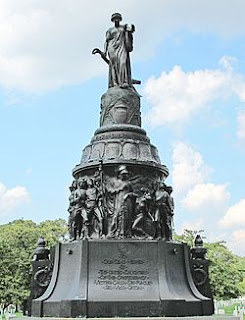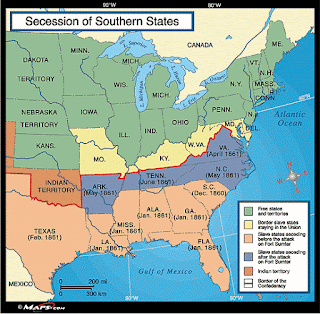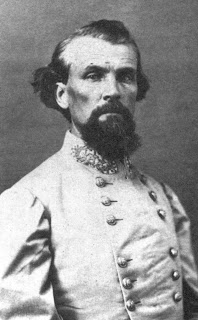 |
| The Confederate Monument Arlington National Cemetery en.wikipedia.org |
Today yours truly would like to take a break from the usual architecture, historic preservation, urban planning and design subjects and spend time taking about a flag. Not just any flag, the Confederate flag, which has been in the media since the heinous killing, by Dylann Roof, of nine people at bible study class at the Emmanuel African Methodist Episcopal Church in Charleston, South Carolina. This flag, labeled by satirist John Oliver a "bad flag," is pregnant with meaning. For the descendants of the soldiers that fought for the Confederate cause, it represents their heritage and Southern pride. For the descendants of the millions of men, women, and children of those that were enslaved, it is a symbol of racism and bigotry. However, despite the clarion calls to remove the flag from public view, what has not been heard is the reason why the American Civil War was fought. The quick and easy is ending slavery. Ta-Nehisi Coates offers his perspective in a recent article for The Atlantic titled "What This Cruel War Was Over." You may be surprised to learn that the reason for the Civil War was not as clear cut as most of us had been taught in school.
 |
| Gov. Nikki Haley with state officials Charleston, South Carolina ibtimes.com |
Most assuredly, Mr. Roof's belief that black lives do not matter beyond subjection is sick and twisted in the same way as the ideology of those who created the flag was sick and twisted. There is no denying the fact that the Confederate flag was directly connected to the cause; that cause was white supremacy, pure and simple. This is not a revisionist, politically correct version of history. There is no need to parse the words of those who raised the flag. Their meaning is clear as day. We here at historicpca.blogspot.com spend time talking about heritage, a word that has gained a lot of traction and will continue do so as this issue plays out in the media. Therefore, like Mr. Coates, blogger feels obliged to discuss the exact meaning of the word "heritage" within the Confederate context.
 |
| Secession of Southern States maps.com |
...A geographical line has been drawn across the Union, and all the States north of that line have united in the election of a man to the high office of President of the United States, who opinions and purposes are hostile to slavery. He to be entrusted with the administration of the common Government, because he has declared that that "Government cannot endure permanently half slave, half free," and that the public mind must rest in the belief that slavery is in the course of ultimate extinction. This sectional combination for the submersion of the Constitution, has been aided in some of the States by elevating to citizenship, persons who, by the supreme law of the land, are incapable of becoming citizens; and their votes have used to inaugurate a new policy hostile to the South, and destructive of its beliefs and safety.
 |
| Slave cabin in Barbour County near Eufaula, Alabama gutenberg.org |
Our position is thoroughly identified with the institution of slavery-the greatest material interest of the world. Its labor supplies the product which constitutes by far the largest and most important portions of commerce of the earth. This products are peculiar to the climate verging on the tropical regions, by an imperious law of nature, none but the black race can bear exposure to the tropical sun. These products have become necessities of the world, and a blow at slavery is a blow at commerce and civilization. That blow has long been aimed at the institution, and was at the point of reaching its consummation. There was no choice left us but submission to the mandates of abolition, a dissolution of the Union, whose principles had been subverted to work out our ruin...
 |
| Jefferson Davis c.1853 en.wikipedia.org |
I say to you here as I have said to the Democracy of New York, if it should ever com to pass that the Constitution shall be perverted to the destruction of our rights so that we shall have the mere right as a feeble minority unprotected by the barrier of the Constitution to giver an ineffectual negative vote in the Halls of Congress, we shall then bear to the federal government the relation our colonial fathers did to the British crown, and if we are worthy of our lineage we will in that event redeem our rights even if it be through the process of revolution.
One hundred fifty years removed from the conflict, it is difficult to comprehend the strident adherence to human bondage. Ta-Nehisi Coates writes, "...at $3.5 billion, the four million enslaved African Americans in the South represented the country's greatest financial asset. And the dollar amount does not hint at the force of enslavement as a social institution." By the start of the Civil War in April 1861, slaveholders firmly believed that slavery "...was one of the great organizing institutions in world history, superior to the 'free society' of the North." Quoting Jefferson Davis again:
You too know, that among us, the white men have an equality resulting from a presence of a lower caste, which cannot exist where white men fill the position here occupied by the servile race. The mechanic who comes among us, employing the less intellectual labor of the African, takes the position which only master-workman occupies where all the mechanics are white, therefore it is that our mechanics hold their position of absolute equality among us.
 |
| James Henry Hammond newdealradio.com |
Black slaves as the foundation of white equality was common theme for slaveholders. In the famous "Cotton Is King" speech, James Henry Hammond drew a comparison between the presumed wage slavery of the North with black slavery as the bedrock of white equality in the South:
The difference between us is, that our slaves are hired for life and well compensated; there is no starvation, no begging, no want of employment among our people, and too much employment either...We do not think that whites should be slaves by law or necessity. Our slaves are black, of another and inferior race. The status in which we have placed them is an elevation. They are elevated from the the condition in which God first created them...They are happy, content, unaspiring, and utterly incapable, from intellectual weakness, ever to give us any trouble by their aspirations...
 |
| Antebellum farm sunnycv.com |
If the policy of the Republicans is carried out, according to the programme indicated by the leaders of the party, and the South submits, degradation and ruin must overwhelm alike all class of citizens in the Southern States. The slave-holder and non-slave-holder must ultimately share the same fate-all be degraded to a position of equality with free negroes, stand side by side; or else there will be an eternal war of races, desolating the land with blood, and utterly wasting and destroying all the resources of the country.
 |
| Antebellum cotton fields awesomestories.com |
Looking into the possibilities of the future, regarding the magnificent country of tropical America, which lies in the path of our destiny on this continent, we may see an empire as powerful and gorgeous as ever was picture in our dreams of history. What is that empire? It is an empire founded on military ideas; representing the noble peculiarities of Southern civilization;...having control of the two dominant staples of the world's commerce-cotton and sugar; possessing the highways of the world's commerce; surpassing all empires of the age in strength of its geographical position;...
 |
| Edward Pollard nps.gov |
...And a footing in Central America will powerfully aid us in acquiring those other states. It will render them less valuable to other powers of the earth, and thereby diminish competition with us. Yes, I want these countries for the spread of slavery. I would spread the blessings of slavery, like the religion of our Divine Master, to the uttermost ends of the earth, and rebellious and wicked as the Yankees have been, I would even extend it to them.
I would not force it upon them, as I would force religion upon them, but I would preach it to them, as I would preach the gospel...
Therefore, when the Civil War began in 1861, the Union forces did not face a pacific Southern society simply wanting to be left alone. They faced an aggressive power, an entire society predicated on the enslavement of a third of its inhabitants with aspirations of expansion beyond its borders. Three months before the War began, Florida secessionists stated the point directly:
At the South, and with our People of course, slavery is the element of all value, and destruction of that destroys all that is property. This party, now soon to take possession of the powers of the Government, is sectional, irresponsible to us, and driven on by an infuriated fanatical madness that defies all opposition, must inevitably destroy every vestige or right growing out of property in slaves...
 |
| Civil War soldiers duckofminerva.com |
'The people of the South,' says a contemporary, 'are not fighting for slavery but for independence.' Let us look into this matter. It is an easy task, we think, to show up this new-fangled heresy-a heresy calculated to do us no good, for it cannot deceive foreign statesmen nor peoples, not mislead any one here nor in Yankeeland...Our doctrine is this: WE ARE FIGHTING FOR INDEPENDENCE THAT OUR GREAT AND NECESSARY DOMESTIC INSTITUTION OF SLAVERY SHALL BE PRESERVED, and for the preservation of other institutions of which slavery is the groundwork.
 |
| Alfred R. Waud Mustered Out Little Rock Arkansas April 20, 1865 Harper's Weekly May 19, 1866 memory.loc.gov |
The kindliest relation that ever existed between the two races in this country, or that ever will, was the ante-bellum relation of master and slave-a relation of confidence and responsibility on the part of the master and of dependence and fidelity on the part of the slave.
In 1917, the publication singled out Nathan Bedford Forrest for particular praise:
Great and trying times always produce great leaders, and one was at hand-Nathan Bedford Forrest, His plan, the course left open. The organization of a secret government. A terrible government; a government that would govern in spire of black majorities and Federal bayonets. This secret government was organized in every community in the South, and this government is known in history as the Ku Klux Clan...
Bedford Forrest should always be held in reverence by every son and daughter of the South as long as memory hold dear the noble deeds and service of men for the good of others, on this earth. What mind is base enough to think of what might have happened but for Bedford Forrest and his 'invisible' but victorious army.
 |
| Nathan Bedford Forrest en.wikipedia.org |
The South fought to preserve race integrity. Did we lose that? We fought to maintain free white dominion. Did we lose that? The States are in control of the people. Local self-government, democratic government, obtains. That was not lost. The rights of the sovereign States, under the Constitution, are recognized. We did not lose that. I submit that what is called "The Lost Cause" was not so much "lost" as is sometimes supposed.
Truth, nothing was really lost because for a century following the Civil War, White Supremacy ruled the region. As that century wound down, as activists began challenging that supremacy, its stalwarts looked for a familiar symbol. You guessed it, that flag. Invocations of the Confederate flag went hand-in-hand with invocations of days gone by. Ta-Nehisi Coates writes, "But by then, neo-Confederates had begun walking back their overt defense of slavery." the United Daughters of the Confederacy magazine opined:
Jefferson Davis, Robert E. Lee, Thomas Jonathan Stonewall Jackson, Nathan Bedford Forrest, Raphael Semmes and the 600,000 soldiers and sailors of the Confederacy did not fight for a "Lost Cause." They fought to repel invasion, and in defense of their Constitutional liberties bequeathed them by their forefathers...
The glorious blood-red Confederate Battle Flag that streamed ahead of the Confederate soldiers in more than 2000 battles is not a conquered banner. It is an emblem of Freedom.
 |
| Civil War battle scene usslave.blogspot.com |
Since the Supreme Court decision of May 17, 1954, reversed what had been the Supreme Law of the land for 75 years and declared unconstitutional the laws of 17 states under which segregated school systems were established, the thinking people have aroused from their lethargy in respects to State's Rights.
From this, we can track the progression of the "Heritage Not Hate" argument. The blatant defense of slavery was out of fashion. Coincidently, those who hold the flag in high esteem, also held the mechanism of white supremacy of that period of time. There were moments when the façade dropped. In 1997, during a debate over the flag, South Carolina State Representative John Graham Altman pontificated, Get out and get a job. Quit shooting each other. Quit having illegitimate babies.
 |
| Bree Newsome vladtv.com |
 |
| #LoveWins boingboing.net |
No comments:
Post a Comment